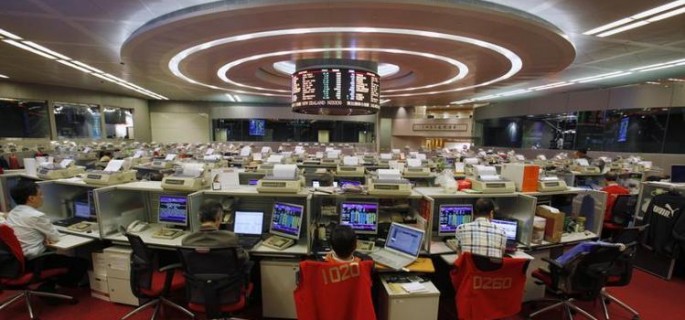China Unveils Plan to Link Shanghai and Hong Kong Bourses

China plans to connect the stock exchanges of Hong Kong and Shanghai, allowing a combined 23.5 billion yuan ($3.8 billion) of daily cross-border trading.
Investors will be able to trade 10.5 billion yuan of Hong Kong-listed stocks through the Shanghai exchange, and 13 billion yuan of mainland shares through Hong Kong, the China Securities Regulatory Commission said in a statement on its website.
Linking the exchanges will “further improve the opening and healthy development of capital markets in China and Hong Kong,” Premier Li Keqiang said in Chinese today at the Boao Forum for Asia Annual Conference, before details of the quota were announced. Stocks with a primary listing in Shanghai have a market value of $1.94 trillion, compared with $3.56 trillion for Hong Kong, data compiled by Bloomberg show.
Policy makers in Asia’s biggest economy are trying to promote Shanghai as a financial hub, drawing more foreign investment and multinational firms. The city inaugurated a free-trade zone in September as part of a goal to become a global financial and logistics center by 2020. The Shanghai Composite Index (SHCOMP) is trading 65 percent below a 2007 peak, while Hong Kong’s benchmark is the second-worst performer this year among developed-market gauges.
The Hang Seng Index rose 0.4 percent to 22,928.35 as of 1:14 p.m. in Hong Kong, extending gains after the announcement. The Hang Seng China Enterprises Index pared its drop to 0.4 percent, with mainland brokerages leading gains on the measure. Citic Securities Co. and Haitong Securities Co. each surged at least 5 percent.
Hong Kong Exchanges & Clearing Ltd. (388), the world’s third-biggest bourse operator by market value, suspended trading at 10:40 a.m. pending an announcement on “the possible establishment of mutual market connectivity,” it said in a statement.
Bigger Profits
Mutual access would boost trading volumes and improve profitability for Hong Kong’s exchange, according to Kenny Tang, general manager of AMTD Financial Planning Ltd.
It would also help the Shanghai market in the long run as foreign investors buy cheap shares, while mainland individual investors would have the option to invest in Hong Kong stocks, Tang said.
The People’s Bank of China said in January last year that it has started preparations for the qualified domestic individual investor program, or QDII2, which will enable individuals to invest in overseas capital markets.
In August 2007, China unveiled a so-called “through-train” program, in which citizens could invest directly in Hong Kong stocks, helping to push the benchmark Hang Seng Index (HSI) to a record that October. China scrapped the plan in January 2010 and instead expanded a program under which Chinese institutions can invest in overseas markets.
Source: bloomberg




























